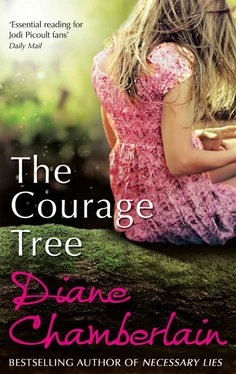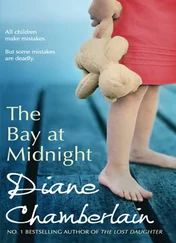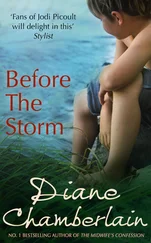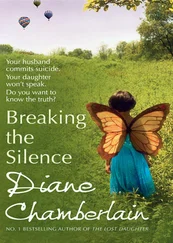She’d left the lid to the pot inside—the tiny, rundown cabin she had quickly come to think of as her home, so she got to her feet and walked inside. When she returned to the small clearing carrying the lid, she spotted a large dog standing a couple of yards from the fire, and she froze. It was the dirty yellow dog this time, as opposed to the huge black bear of a dog who had visited her a few days earlier. Both of them had temperaments as nasty as their matted and unkempt coats. When she’d first seen the dogs, she’d feared they belonged to someone living nearby and that she was not alone in these West Virginia woods. But their hungry, neglected appearance made her think they were probably wild.
The yellow dog looked in her direction, silently baring his teeth.
“Scram!” she shouted at him. “Get lost!” She banged the lid against the flat rock, and that seemed to work. The dog turned around and trotted off into the woods.
It was her fault the dogs hung around the shanty. She’d made a tactical error with them in her early days out here. She had killed her first animal, another rabbit, and she’d had to force herself to go through the motions of preparing it to eat. Following the instructions in one of the wilderness survival books she’d brought with her, she told herself she had no choice: she would need protein to be able to live out here. Despite the fact that she’d fashioned an impressive spit above the fire and that the aroma of the cooked rabbit had actually made her mouth water, she had not been able to make herself chew and swallow the meat. Instead, she’d tossed it into the woods. That night, she’d lain awake, weeping quietly over the life she’d taken for no good reason, and listened to animals—wild dogs, she knew now—fighting over the carcass in the darkness.
The next time, though, she was hungrier and more determined. Marti was a meat eater, and Zoe knew she would have to be able to kill and cook meat to feed her. On that day, she killed and ate her first squirrel. She’d also caught a small, dark-scaled fish in a net she’d brought with her, and she’d managed to get that down despite the fact that it bore no resemblance to any other fish she’d ever eaten and could have been poisonous for all she knew.
The water was boiling, and she leaned forward to stir the stew before covering it with the lid. The fire pit was in the exact center of the small clearing, just a few yards in front of her shanty. That was what she called the dilapidated cabin, finding shanty a far prettier word than hovel or shack, which would have been a more accurate description of the building. Her little shanty was hidden so deeply in the forest that Zoe was certain no one would find it unless they actually knew it was there.
She herself had found the structure through a painstaking search of these wooded West Virginia mountains back in early April, when she and Marti first agreed on their plan. She’d actually discovered several abandoned cabins, but this one had appealed to her most, both practically and aesthetically. On the practical side, it was far from the nearest road, a good five miles, and even that road was barely paved and rarely traveled. The nearest main road was a couple of miles beyond that one. This cabin was as far from civilization as Zoe had ever been, and she was frankly thrilled by the distance between her and the rest of the world. That world thought she was dead. It held nothing for her any longer.
Her shanty would never appear in Better Homes and Gardens, but it was still more appealing than some of the other shacks she’d seen. Some of them were little more than decrepit piles of rotting wood, while this one had a little character. It was a log cabin and looked as old as the mountains themselves. The logs were separated by a mortar that had once been white, but was now green with moss on two adjacent sides of the house, dirty and crumbling on the others. The roof was rotting, and she’d initially covered the decaying wood and scraps of tin with the tarp she’d brought along with her. But then she realized that, if anyone should find his way to her little clearing, the bright-blue tarp would give away the fact that someone was living in the shanty, so she took it down. Now, when it rained, she put a couple of buckets beneath the worst spots in the roof and let it go at that.
Inside the front door of the shanty was, what she called for want of a better term, the living room, which ran the width of the building. Behind that, an identical room served as a bedroom. And that was it. A two-room log cabin, both rooms together nearly equaling the size of her Malibu bathroom.
But the shanty had what she was coming to think of as amenities. Remarkably clear water ran from a rusty old pump in the overgrown yard. A wood-burning stove in surprisingly good shape sat on the floor in the main room, its chimney pipe winding its way through a leaking hole in her roof. The pipe was round, the hole square, and that about summed up the care that had been taken by whomever constructed this place. She’d used the stove only once to cook on, but it heated the entire shanty, and she knew she would have to do her cooking outside until the cooler months. At least she and Marti would not freeze here in the winter.
There was a sofa in the living room, and once she’d gotten over the revolting, disintegrating fabric and protruding tufts of stuffing, she was grateful for a place to sit. She’d brought a dozen or so sheets with her, and she threw a cream-colored one over the sofa and thought that it looked like it came straight out of some campy catalogue—as long as no one noticed the splintery wooden floor beneath it and the lack of glass in the window behind it.
Not far from the house, but hidden behind a shield of brambles and vines, was an outhouse. It tilted to one side, giving her vertigo when she sat inside it. The outhouse had smelled nearly as fresh as the forest when she’d first arrived, a testimony to how long it had been since anyone had called this place home.
When she’d first stepped inside the cabin, the floor had been covered with debris—branches and twigs and rotting leaves that had fallen or blown through the gaping holes in the roof. Mice skittered away from her broom, and she remembered reading something about mice droppings causing that flesh-eating virus, so she’d covered her nose and mouth with a kerchief, unsure if that would help. Unsure if it really mattered. She just needed to live long enough to save her daughter. After that, death could come anytime, and she truly wouldn’t mind.
Once she’d emptied the back room of its tree branches and leaves, she discovered four sleeping palettes on the floor, one in each corner. She’d brought two air mattresses with her, which she inflated on the palettes against the far wall. Then she tore one of the king-size sheets and made the palettes and mattresses up as best she could. She’d stepped back to look at them and was amazed at how much the simple sight of those two low beds, dressed in Egyptian cotton, pleased her. She was glad she’d thought to bring these lavender sheets; they were the only ones that did not remind her of Max, since he’d always hated the color and she had used them only on the guest beds. She hadn’t wanted to bring any tangible traces of her grief with her. Living here would be hard enough without adding mourning to her list of things to do. Once she’d left Malibu, once she’d pulled the car out of the driveway and headed for the mountains, she knew she was leaving Max behind forever. She was leaving everything behind—except her duty as a mother.
She’d been in the shanty for over a month now, but she’d been planning this trip, this new life, for weeks prior to her “suicide.” She’d been planning it ever since Marti had written her, telling her she was being transferred to the prison at Chowchilla. It had been unbearable to picture Marti in prison anywhere, but Chowchilla, with its reputation for abusive guards, toughened prisoners and intolerable living conditions, was out of the question. Zoe had lain awake all that night, Marti’s letter in her hand, a bizarre plot taking shape in her mind.
Читать дальше












